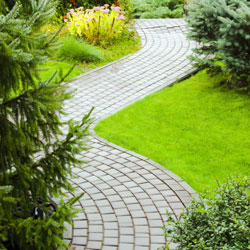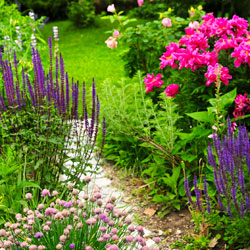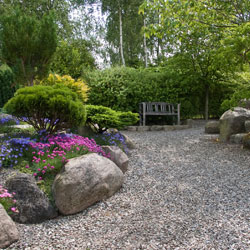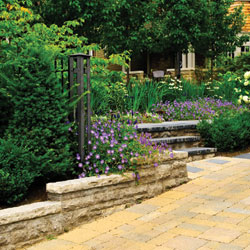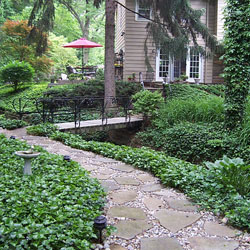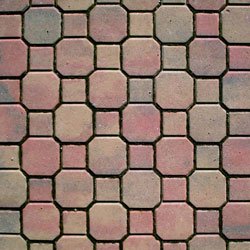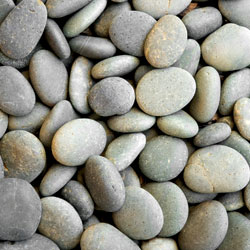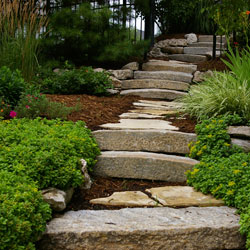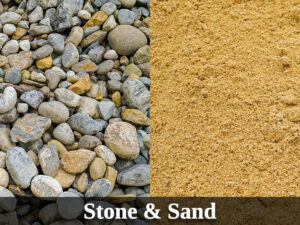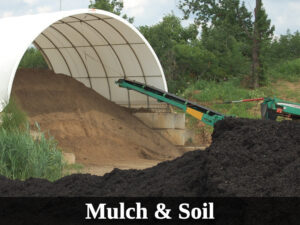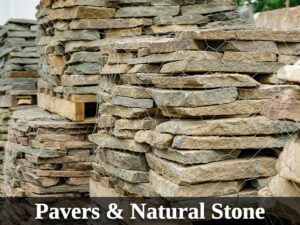The hardscaping in your landscape, including pathways, steps and patios, is a key element of your yard, and the decision to opt for natural stone or pavers is not one to consider lightly or without scrutiny of both materials. By carefully comparing the pros and cons of each option, you can choose the best material and design for your home, needs and budget.
About Natural Stone
Natural stone is any stone material that has been naturally quarried for construction use, including home interiors as well as landscaping. There are different types of stone that make ideal landscaping options, including flagstone, slate, granite, limestone and fieldstone. Each one has a unique texture and variable colors, with rich, natural appeal. The stones may be cut rugged or smooth to suit different design preferences, and can be fitted into any type of landscaping design. Many designers opt to use natural stone for a more rugged or rustic look, and it is always beautiful when the type of stone is matched to the surrounding region for an integrated look.
There are several pros to using natural stone for your landscaping needs, including…
- Natural material has color and texture variations for more visual interest
- Generally does not require sealants or other treatments to stay at its peak
- Extremely durable when correctly cut and installed, making it ideal for heavy use
- More of an artisan look with a timeless appeal
Of course, natural stone may not be ideal for every landscaping project. The potential cons of using natural stone include:
- Potentially more expensive than pavers or other manufactured options
- Requires more expertise and extensive labor to install correctly
- Top layers on certain types of stones may occasionally shear or splinter off
About Pavers
Pavers are engineered concrete stone, often created in uniform, symmetrical shapes. Because they are more geometric than natural stone, they have much more flexibility for landscaping design options, and because they are engineered, there are more color options than most natural stones. The color is also more uniform, which can give your landscaping a more formal or planned look than the rustic nature of natural stone.
The benefits of using pavers for all your hardscaping needs include…
- Greater customization for project designs and color choices
- Generally cheaper than natural stone, depending on options
- Less time to install a complete project, so you can be enjoying it sooner
- Easier to repair or replace if any one paver is damaged
- Durable material is suitable for both moderate and heavy use
Just as with natural stone, however, there are cons that must be considered before choosing pavers for your patio, driveway, paths, edging or other projects, such as…
- Slight fading is common after installation, particularly in full sun
- Joints and seams need to be periodically resanded
- Stones may absorb stains if sealant is not applied and renewed appropriately
- Smaller stones may settle more easily if not installed properly
Considering the Value of Natural Stone vs. Pavers
Whichever material you choose, both natural stone and pavers can add value and beauty to your landscaping and outdoor living areas. Professional assistance from start to finish will ensure the project looks its best, meets your needs and will have fewer long-term difficulties. The very best value for both natural stone and engineered pavers will include expert design consultation, a thorough project plan and experienced installation.
Choosing between natural stone and pavers is a very personal decision, and different projects and design preferences may prefer either material. The choice often depends on the available budget, the amount of use the area will receive and how to coordinate with the house and surrounding landscape. Properly done, however, both materials can add amazing value to your property and you will enjoy your hardscaped areas for many years to come.
